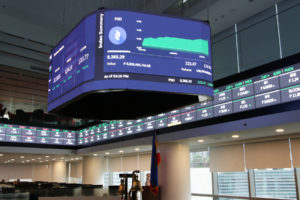Coming from a volatile year that was 2020, investors can ride on a global-scale comeback by investing in stocks and other risk assets, according to experts from British banking giant HSBC.
Locally, the main-share Philippine Stock Exchange index (PSEi) could recover to 7,650 by the year’s end on the back of a 49-percent growth in earnings per share, said Cheuk Wan Fan, chief investment officer for Asia, at HSBC Private Banking and Wealth Management.
HSBC Private Banking recommends an “overweight” position on global equities, global investment grade and high yield credit, emerging market and Asian hard currency bonds. This means that investors are advised to buy in excess of the allocation prescribed by the benchmark index.
In the case of the Philippines, however, the house view is still “neutral” as foreign investors stay on the sidelines.
A modest gain of 510.29 points or 7.14 percent from last year’s finish would be driven by the reopening of the domestic economy, Fan said in a press briefing on Wednesday. She said the neutral view was due to the relative risk reward prospects, adding that local equity valuations have already gone up to 19 times projected earnings. The historical valuation is only at 15 times expected earnings.
For the full year, HSBC’s expectation of a 49-percent rebound in earnings would come from an assumed 43-percent contraction in 2020.
The Philippine gross domestic product (GDP) is seen to grow by 6.5 percent this year after a likely full-year contraction of 9.7 percent in 2020 due to pandemic disruptions. This year’s rebound would likely be supported by renewed infrastructure investments, gradual economic normalization and vaccine rollout.
“However, the Philippine economy will likely stay below its 2019 levels by end-2021. The country’s public debt will continue to rise over the next couple of years to above 60 percent of GDP, as wider fiscal deficits become the new norm after the pandemic crisis,” Fan said. HSBC also expects the Bangko Sentral ng Pilipinas to keep its policy rate unchanged at 2 percent this year. Bank lending growth has decelerated to its lowest level since 2008 despite record-low interest rates. HSBC also expects the peso to take a pause from its strong run, especially with a moderate current account surplus in 2021. HSBC also holds a neutral view on the Philippine peso, forecasting it to trade at P46 against the US dollar by the end of the year.
“On the fiscal front, the government’s priority is to pass the 2021 budget, which proposes a 10-percent increase in government spending from last year. Inflationary pressure should remain benign, but upside risks loom as lockdown restrictions ease and economic activity normalizes later this year. Taking into account supply-side constraints and adverse weather, we forecast headline CPI (consumer price index) inflation to rebound to 3.3 percent by end-2021 from 2 percent in end-2020,” added Fan.
HSBC’s bullish view on risk assets this year is driven by the global vaccine rollout, continued ultra-loose monetary policy, new fiscal stimulus, abundant liquidity and strong earnings recovery.
“Global economic growth is improving and broadening beyond manufacturing and the digital economy … Governments are rebuilding their economies, and the healthiest companies are investing to adapt to the new post-COVID-19 realities and opportunities. All of this means that the global economy and corporate profits should be bigger and healthier in 2021 than they are currently,” said Willem Sels, global chief investment officer at HSBC Private Banking and Wealth Management.


